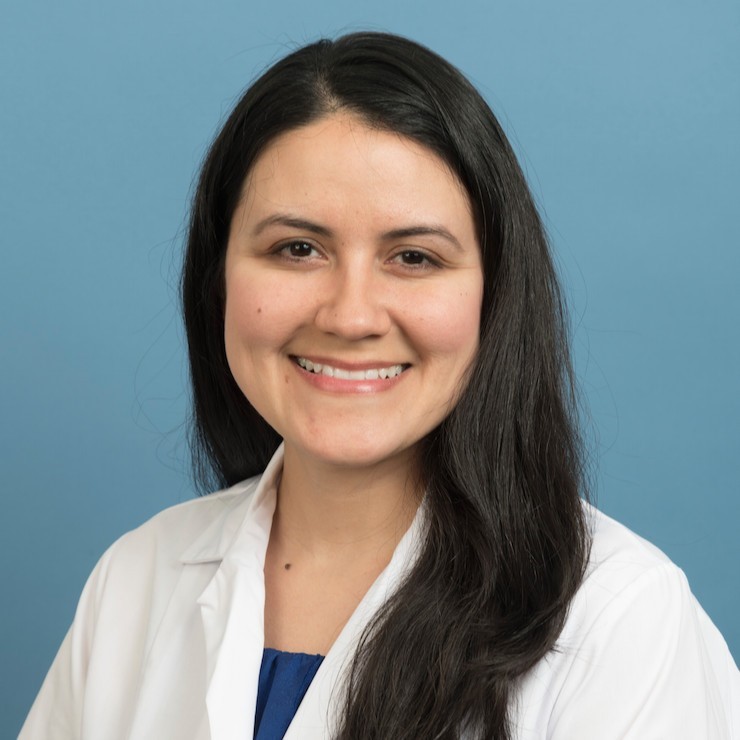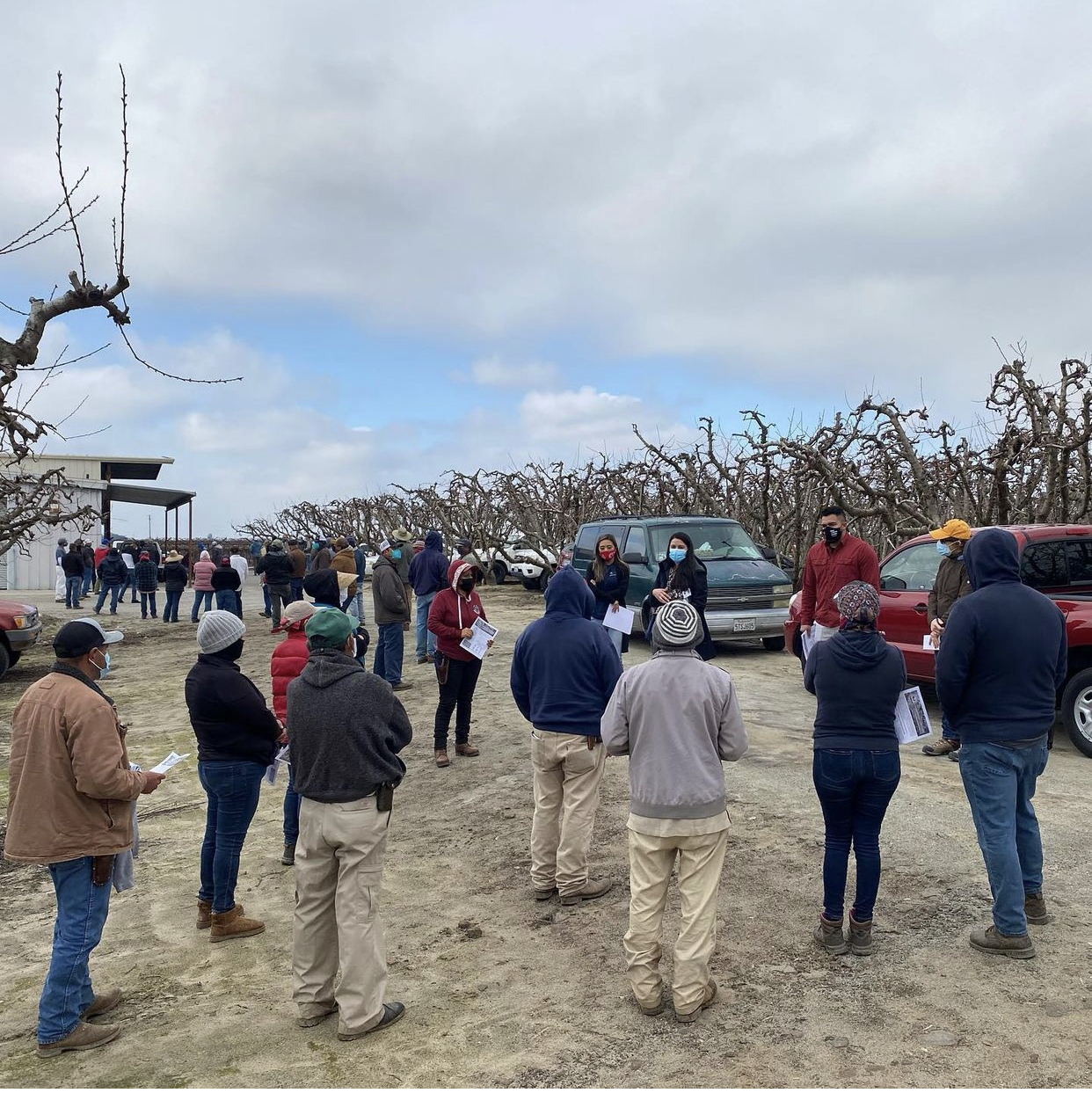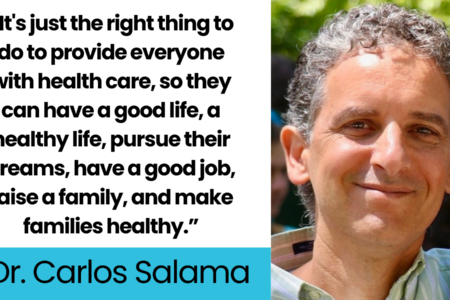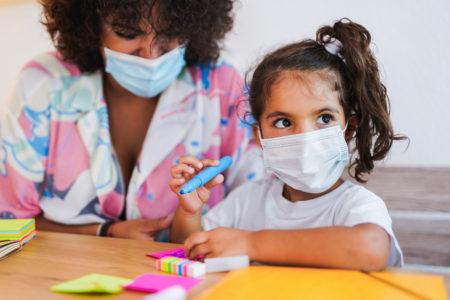Share On Social!
In the small rural Central California town of Selma, a young Trinidad Solis watched long stretches of farmland float by through the car window.
She listened to her parents in the front seat discuss their upcoming doctor’s appointment in Spanish.
As Mexican immigrant farmworkers, Solis’ parents faced hardships accessing healthcare, including a language barrier.
Since her parents were monolingual Spanish-speakers, Solis often served as translator during her parents’ health appointments and helped them navigate the complex healthcare system.
These childhood interactions spurred Solis’ desire to become a bilingual, culturally sensitive family physician who could provide healthcare, including infection prevention and control services, to vulnerable patients like her parents.

With this goal in mind, Solis became the first of her siblings to leave her small farming town to pursue a college education.
But when she graduated with her MD from the University of California, San Francisco, Dr. Solis felt that she needed a stronger background in public health to treat patients on a holistic level, taking into consideration social determinants of health – the conditions in which people are born, grow, live, work, and age. Thus, she went on to earn her Master of Public Health degree at Johns Hopkins Bloomberg School of Public Health.
A west coaster at heart, Dr. Solis’ next goal was to move back to California to complete her residency training in family medicine at the University of California, Los Angeles.
There, her background in medicine and public health helped her treat the “root causes” of many of Los Angeles’ low-income, Spanish-speaking patients.
“A lot of my patients were disproportionately affected by obesity, diabetes, and infectious diseases,” Dr. Solis said. “As I spent more time with them, I got down to the root causes of their complications, which stemmed from social determinants of health issues. For example, some patients couldn’t afford their medications, so they stopped taking them, which worsened their condition.”
Going Beyond the Clinic Walls
These experiences inspired Dr. Solis to tackle health disparities from a different angle – the community level.
She got her chance to fulfill this aspiration when the COVID-19 pandemic swept California.
Knowing how the SARS-CoV-2 virus could wreak havoc on vulnerable farmworkers, many of whom are Latino, she decided to move back to her hometown area in California’s Central Valley to help the same community that inspired her to become a doctor.
At the beginning of the pandemic, Dr. Solis began working with the Fresno County Department of Public Health (FCDPH). She helped coordinate the department’s efforts to protect farmworkers against COVID-19.
“Here in Central California, we have one of the largest number of farmworkers,” Dr. Solis explained. “Unfortunately, because of barriers to accessing healthcare, this population was especially vulnerable to contracting and having complications from COVID-19.”
Efforts to protect farmworkers against COVID-19 focused on addressing these barriers to healthcare, such as lack of transportation and inability to take off work to receive the COVID-19 vaccine.
“Sometimes when farmworkers would get off work, health clinics would be closed,” Dr. Solis said. “We wanted to help these workers get healthcare where it was most convenient to them. We began offering the COVID-19 vaccines at their workplace. We were one of the first counties in the country to do that.”
Many employers were cooperative, supportive, and “opened their doors” to Dr. Solis and her team at the FCDPH.

“It was really lifesaving for their workers. Before that, many farmworkers were getting infected,” Dr. Solis said.
Today, Dr. Solis and several Fresno County medical partners have administered over 35,000 vaccine doses to farmworkers at their workplace. Dr. Solis credits the success of the program to partnerships with mobile clinics and community health workers (also known as promotoras) who connect Latinos to local resources.
The program has even planted the groundwork for future projects to improve community health, such as mobile health events to educate about chronic and infectious diseases.
“This whole journey giving back to my community has been so fulfilling,” Dr. Solis said. “I feel fortunate to use my professional role to increase healthcare access for our vital farmworkers and decrease the spread of infectious diseases in both the clinical and community setting.”
A Greater Role in Infection Control
In early 2022, Dr. Solis’ hard work during the COVID-19 pandemic was recognized.
She was promoted to deputy health officer at the FCDPH, where she would gain an even greater role in infection prevention and control.
Her typical day involves meeting with county hospitals and clinics, assisting with writing health advisories for the health department, and guiding the department’s response to infectious disease outbreaks, such as the recent monkeypox outbreak.
“We have to be ready to mobilize when necessary, so this is where my public health training really helps,” Dr. Solis explained.
As deputy health officer, Dr. Solis also educates local and state-level community health workers about infection control practices. This information is then relayed to the community, which helps reduce hospital admissions and the risk of further disease spread in the clinical setting.
In her meetings with local clinics, Dr. Solis also encourages critical infection control practices, especially the basics, such as hand washing, changing gloves between patients, and wearing a mask, when necessary.
“These infection control actions are not only important for keeping patients safe, but also for keeping healthcare staff safe,” Dr. Solis said.
Cultivating a Bright Future
Through Dr. Solis’ passionate work serving the vulnerable farmworker community, and by being a Latina physician herself, Dr. Solis understands the importance of diversifying the healthcare workforce to reduce health disparities.
She encourages other first-generation college students that are interested in a health career to reach out to mentors for guidance.
“Ask for help,” Dr. Solis said. “Early on I was encouraged to seek out mentors, and while I wasn’t used to asking for help, mentors were critical to my success. I still have mentors for different areas of my life today.”
Dr. Solis is a strong advocate for increasing healthcare access in Fresno County’s vulnerable communities.
In her new role as deputy health officer, she looks forward to harvesting more innovative solutions to promote health equity and prevent the spread of infectious diseases in her community and local hospitals and clinics.
What Can You Do to Promote Infection Control in Your Healthcare Setting?
Help keep yourself, your colleagues, and your patients safe from infectious disease threats, such as COVID-19, by building on your infection control knowledge!
To show your dedication, sign this pledge to complete an infection control training or activity through CDC’s Project Firstline!
Access more information about infection prevention and control in healthcare by visiting resources from CDC Project Firstline.
Salud America! at UT Health San Antonio is working with the National Hispanic Medical Association to bring Project Firstline infection control educational content to healthcare workers, so they are equipped with the knowledge they need to protect themselves, their facilities, and their patients (Latinos and all communities) from infectious disease threats in healthcare settings.
You can read these articles:
- What is Project Firstline?
- What is the Goal of Infection Prevention and Control in Healthcare Settings?
- What’s a Virus?
- What is Ventilation and Why Does It Matter?
- Contact Time: What is It and How Does it Impact Infection Control?
- The Surprising Difference Between Cleaning and Disinfection
- What’s a Respiratory Droplet and Why Does It Matter?
- We Need to Talk about Hand Hygiene Again
- Why are Gowns, Gloves, and Eye Protection Recommended for COVID-19?
Learn More about Project Firstline!
Editor’s Notes:
This article is part of a collaboration between Salud America!, the National Hispanic Medical Association, and the CDC’s Project Firstline. To find resources training materials, and other tools to bolster knowledge and practice of infection control, visit Project Firstline and view Salud America!’s infection control content.
The above featured image of Dr. Solis is from the Fresno County Department of Public Health.
Explore More:
Infection ControlBy The Numbers
142
Percent
Expected rise in Latino cancer cases in coming years
This success story was produced by Salud America! with support from the Robert Wood Johnson Foundation.
The stories are intended for educational and informative purposes. References to specific policymakers, individuals, schools, policies, or companies have been included solely to advance these purposes and do not constitute an endorsement, sponsorship, or recommendation. Stories are based on and told by real community members and are the opinions and views of the individuals whose stories are told. Organization and activities described were not supported by Salud America! or the Robert Wood Johnson Foundation and do not necessarily represent the views of Salud America! or the Robert Wood Johnson Foundation.




[…] The pandemic is another chapter in the bitter story of American racism and inequality. Black and Latinx people are being infected and are dying at much higher rates than white Americans. Many people of […]
[…] coronavirus has killed over 61,000 Latinos in America according to the CDC, accounting for over 18.2% of the total COVID deaths in the […]
[…] Whereas Hispanics make up 11% of D.C.’s inhabitants, they signify 19% of the COVID cases, and 14% of the deaths. Equally, 46% of D.C.’s residents are Black, they usually make up an alarming 75% […]
[…] and historical mistreatment. According to the U.S. Centers for Disease Control and Prevention, Latino and Black American communities are three times more likely to become infected with […]
[…] Covid pandemic has hit the Latino community particularly hard, and data from the nonprofit health equity advocacy group Salud America! shows Latinos lead in the 0-24 age […]
[…] the pandemic, Latinos took major blows, both in terms of COVID-19 cases and also from the economic recession under former President Donald Trump. Nearly half (49%) of […]
[…] the positive trend, the harm may have already been done. The pandemic has disproportionately impacted Latino communities. Reuters reported that election-related or political disinformation that […]
[…] pesar de la tendencia positiva, es posible que el daño ya esté hecho. La pandemia ha impactado desproporcionadamente Comunidades latinas. Reuters informó que la desinformación política o relacionada con las […]
[…] residentes blancos muestran una tasa mucho más baja con 10 muertes por cada 100,000 habitantes(8 9) . Los afroestadounidenses por su parte, denuncian subsistemas de salud que les segregan […]
[…] https://salud-america.org/coronavirus-case-rates-and-death-rates-for-latinos-in-the-united-states/ […]
[…] https://salud-america.org/coronavirus-case-rates-and-death-rates-for-latinos-in-the-united-states/ […]
[…] communities have the second-highest number of COVID-19 cases in the U.S. They’re also more likely to become hospitalized and die from the disease than other […]
[…] total, around 160,000 Latinos were killed by COVID-19. This accounts for 16% of the 1 million deaths in the country. The […]